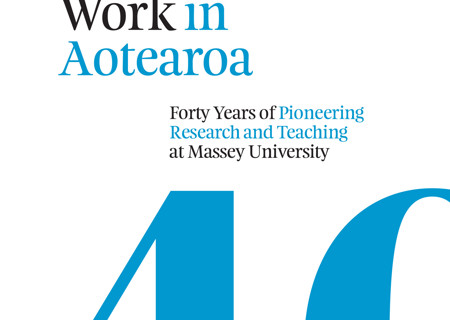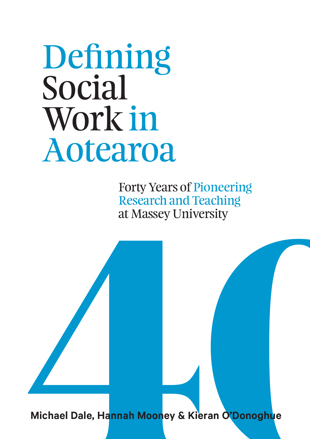1. What was the motivation for writing this book?
Over the past decade several of our longstanding and former staff members who held the oral history of the programme and social work in Aotearoa New Zealand had either retired or passed away. This realisation highlighted the importance of the 40th anniversary in 2016. Another motivating factor is that it is a way of connecting our current students and staff to those who have gone before us and the many ways in which they have contributed to defining professional social work in Aotearoa New Zealand.
2. Those early years of the school had such a palpable sense of mission about them. Do you think that drive is still there today in the profession?
Yes. Undoubtedly, Merv Hancock and Ephra Garrett’s vision for the programme is still very much alive, and although times have changed, social issues in New Zealand are still very apparent. The Massey social work programme aims to be at the forefront of working to address these issues.
3. Some outstanding individuals have been part of social work at Massey. It’s always invidious to do this, but who would you single out?
This is definitely a difficult task as there are many who have had a significant role in the programme over the past 40 years. Merv Hancock, Ephra Garrett and Graeme Fraser were significant in the establishment of the programme. Ian Shirley, Rajen Prasad, Mike O’Brien, Mary Ann Baskerville and Angie Barretta-Herman built on that foundation. Robyn Munford and Mary Nash really advanced the postgraduate offering, publications and research standing, while Leland Ruwhiu, John Bradley, Wheturangi Walsh-Tapiata and Rachael Selby established the foundations for indigenous social work scholarship. Since 2010, Mark Henrickson has made an outstanding contribution to international social work, while Kieran O’Donoghue, Lareen Cooper and Kathryn Hay have steered the school through the challenges the programme has faced as social work has professionalised. In the research space, Robyn Munford and Jackie Sanders have made a significant impact in the youth development field through their MBIE study.
4. You list all Master’s and PHD theses from within the school and also all the research papers and books by School of Social Work graduates and staff. Did the scale of it surprise you?
Yes, the range and depth of scholarship is impressive.
4. Is there still something particular about the way social work is taught at Massey and about the approach of its graduates?
The Massey programme is known for producing critical thinkers and reflective practitioners.
5. What’s one new thing you learned from working on this book?
The value of the stories and relationships among staff and students over the years.
6. Did writing this book further confirm for you why is social work such an important field? Explain how?
The focus of this book was on the Massey programme, but linked to the broader social, economic and political issues of each decade. The wide-reaching impact of social work is notable through academia, through theory and practice, through influencing policy and so on. Social work continues to play an essential role in helping those most in need, and it’s critical that it is up-to-date and responsive in the bicultural and multicultural environment of Aotearoa New Zealand.
8. What do you hope that readers will take away from the book?
We hope that readers will see the potential for social work to empower those we work with at an individual level and also its role in continuing to challenge structural conditions and strive towards a more egalitarian society. At a more personal level, the book aims to connect with staff and student alumni to show that we have all been a part of this 40-year journey within Massey and that we have all had a role in the wider contribution to society. The programme has a ripple effect on our communities, from the grass roots right through to government, national and international.
9. How did you structure working on this book as a team?
The concept and planning was a combined effort. We drew on the strengths and experience that each brought to the team.
10. What are you each reading at the moment, for work and for pleasure?
Michael: I am reading articles that focus on child-centred practice. For pleasure I am reading Franz Kafka’s Metamorphosis.
Hannah: I am reading a course text, Developing Helping Skills by Chang, Decker and Scott (2018). I haven’t read a book for pleasure in a while and enjoy the company of my children in my spare time.
Kieran: For work I am reading Nick Gould’s Mental Health Social Work in Context. For pleasure I’m reading It's a Lot Like Dancing: An Aikido Journey by Terry Dobson, Riki Moss and Jan Watson.


